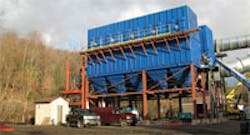There’s always a plan underway at Benton Foundry, according to the president and owner Fritz Hall, and the improvement project now in progress there have been in planning for some time. Hall says the timing is fortuitous, because the capabilities for the Pennsylvania iron foundry may allow it to take advantage of a rising number of orders from customers anxious to source castings domestically – because of the shifting U.S. currency exchange rates. As dollars become more affordable, buying from U.S. suppliers is a better investment, a conclusion Hall says is being reached by global manufacturers as well as domestic organizations that may have shopped for castings overseas.
Benton Foundry, in Benton, PA, casts a wide range of gray, ductile, and ADI products weighing up to 250 lbs. However, that capability will increase to larger castings in the third quarter of next year once a new DISA (www.disagroup.com) molding machine is installed and operating. Hall reveals that the new machine is being specially developed by DISA, with a 2832- in. flask, to accommodate Benton’s plans to deliver larger products – with castings weighing up to 350 lbs.
The foundry’s customers are manufacturers of pumps, valves, and manifolds, as well as components for electric motors, and the demand for larger products continues to rise, Hall indicates. Thus, the new DISA will join two machines already in operation, along with three Hunter machines, to increase the range of Benton’s casting capabilities.
The foundry produces manually molded castings in short runs, too. The new DISA machine will help to increase output from 180 tons/day of castings to as high as 300 tons/day, more indication of Hall’s determination to produce higher quantities of larger castings.
Benton castings are produced with cores manufactured by the shell, Isocure, and Pepset processes, and an increasing demand for castings with more detailed interior designs is another trend the company is following. It is among a series of factors Hall says make for a good business environment for foundries, as long as the management remains informed and involved with the production and market placement of their castings.
As a result according to Hall, Benton Foundry keeps track of metalcasting trends regarding technology, production, and strategies for serving the market. For example, while opportunities to succeed are strong at the moment, raising demand for castings will not prevent some foundries from losing business, if they are not responsive to customer’s expectations.
Hall says the changes underway at Benton are largely driven by demands for greater consistency in the products they buy. Buyers want high-quality, well designed castings. Foundries must provide the design expertise and quality certification that will guarantee customers’ satisfaction. In turn, Benton offers on-site lab testing to provide that assurance, along with decades of production and managerial experience.
Benton Foundry has been family owned and operated since the late 1950s — Fritz’s son Jeff is also involved in the daily operation of the business — and Hall has just marked his 50th anniversary in the business. In that time, he has developed an expertise at all the sub-specialties in metalcasting (molding, coremaking, melting, pouring and so on), and distinguished himself as a handson executive — which means instituting and maintaining a dynamic and rewarding atmosphere for workers. Hall maintains that the foundry industry is changing faster than it has during any time in his career, and keeping up with technical advances is a matter of survival for such businesses.
